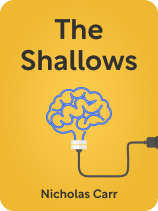

This article is an excerpt from the Shortform book guide to "The Shallows" by Nicholas Carr. Shortform has the world's best summaries and analyses of books you should be reading.
Like this article? Sign up for a free trial here.
Is the internet reshaping our brains? How might our digital habits affect our ability to concentrate and retain information?
Nicholas Carr’s book The Shallows: What the Internet Is Doing to Our Brains explores the impact of Internet use on our cognitive functions. He argues that our online activities are altering our neural pathways, potentially diminishing our capacity for deep reading and sustained focus.
Keep reading to explore Carr’s insights and their implications for our daily lives.
The Shallows: What the Internet Is Doing to Our Brains
It’s undeniable in the 21st century that the internet and other digital media have vastly reshaped the world’s information landscape. What’s less obvious is how profoundly the internet is changing those of us who use it every day. While some of its effects are clear (we stare at screens, respond to emails, and find information more quickly than ever) the internet’s influence on our minds may be deeper—and more troubling—than you may have guessed.
In The Shallows: What the Internet Is Doing to Our Brains, published in 2010, Nicholas Carr offers a warning. He suggests that our reliance on this digital tool is reshaping our thoughts and behaviors, a change that manifests as dwindling attention spans and an inability to engage in deep reading or effective concentration. Carr also considers whether our dependence on digital technology might rob us of essential human qualities like empathy and quiet reflection.
Carr is a journalist who’s written much in the fields of technology, business, and cognition. Before The Shallows, which was a finalist for the 2011 Pulitzer Prize, Carr wrote Does IT Matter? and The Big Switch, both about the economic and social consequences of the expanding digital universe.
In this overview, we’ll explain how internet use alters our thoughts and perceptions by examining how human brains reconfigure themselves to adjust to new experiences. We’ll look at how new forms of media impact how people interpret and process information, as well as the societal consequences that changes in human cognition might bring about.
How the Mind Adapts to Technology
We like to believe that our minds are our own—it may be disturbing, therefore, to imagine that the tools we use could be rewiring our brains. Nevertheless, we’ll explore the profound impact of internet use on how we think and perceive the world. To begin, we’ll examine how our brains adapt to new learning and experiences, specifically focusing on how surfing the internet can alter brain structure. Then, we’ll underscore how any new media changes not only our access to information, but also how we perceive and process that information.
Neuroplasticity and Memory
To understand how information technology alters our perceptions, it’s necessary to explore some fundamentals about how the brain works. As Carr asserts, internet use naturally affects how we think because any information we’re exposed to affects how our minds interpret the world around us. First, we’ll shed light on how learning and experience shape our neural pathways and how internet use is actively modifying brain structure. Next, we’ll discuss the mechanics of memory to understand its role in converting learning and experience into coherent knowledge structures in our minds.
The key to understanding how internet use reshapes our minds is neuroplasticity, the brain’s ability to change its structure and functions based on learning and experience. Carr explains that each of our neurons (brain cells) makes thousands of connections with others in the brain, forming the neural circuits that define us. As we learn new information or skills, fresh neural connections form. Repeatedly reviewing information or practicing a newly learned skill strengthens the associated neural pathways, while unused connections weaken and disappear. And, despite the aphorism that “old dogs can’t learn new tricks,” our brains’ adaptability never vanishes entirely, though it does diminish as we age.
Neuroplasticity explains how internet use alters the brain’s structure. The neural pathways we develop to process fast-paced information—such as what we receive online—replace neural connections that internet use suppresses, such as those that help us to focus our attention. Carr points to studies which show that even five hours online can cause the formation of new neural pathways in non-internet users, rewiring the brain for internet use. Though forming new pathways in the brain isn’t bad, internet use is also mentally taxing. Reading engages the visual processing, memory, and language centers of the brain, but using the internet also triggers decision-making and problem-solving mental circuits, and not necessarily to good effect.
Carr says that, in addition to neuroplasticity, it’s important to understand how the human brain creates and retains memories because internet use interrupts the brain’s natural process of memory creation. Our brains use two types of recall—short-term (working) memory and long-term memory, both of which play distinct roles in assimilating information from our experiences into meaningful knowledge structures in our minds. Information enters short-term memory first—it’s what we’re experiencing at any given moment. To retain this knowledge for more than a brief period, your brain transfers it into long-term memory, where it becomes part of your broader understanding of the world and how stand-alone facts interrelate.
Tools as Mind Enhancers
That an information tool such as the internet can change our mental processes shouldn’t come as a surprise—after all, our brains have been adapting to new media ever since our distant ancestors started painting on cavern walls. The constant evolution of media and technology doesn’t just alter how we access information, but also how we perceive and process it. New information technologies reshape human behavior, thinking patterns, and societal structures, especially language-based media, which possess a unique power due to language’s central role in how we think.
Every new form of media, from books to radio, television, and the internet, changes both the information we consume and how we think about it. While critics debate the value of every new medium’s content, Carr insists that it’s technology itself that changes human behavior and how we process information. For example, Carr discusses how maps and clocks dramatically altered how we perceive space and time. Maps expanded our ability to visualize physical space in the abstract, while clocks segmented time into measurable units, shifting people’s daily lives away from nature’s rhythms and toward quantifiable schedules. Both technologies reshaped society as a whole by imprinting their ways of seeing the world into the way people think.
Carr argues that any mind-enhancing technology is based on assumptions about how the brain should function, and, when you use these technologies, your brain accepts these assumptions as a given. For example, the invention of the pocket calculator came with the assumption that machines are better at math than humans. Therefore, if you use a calculator to solve every math problem that comes your way, you train yourself and adapt your behavior to make the most efficient use of the calculator as a tool. Through neuroplasticity, your brain rewires itself to the calculator’s functions while discarding any math skills you let slide, such as doing simple arithmetic in your head.
Language-based tools exert the most significant influence on our minds because language is our primary communication medium. Learning to read and write, both of which are technological skills, shifted human society from spoken-word cultures to literate ones by changing how we present information—we no longer had to rely on listeners memorizing knowledge so they could pass it on. Carr writes that making reading affordable and convenient resulted in its widespread adoption, facilitating unprecedented access to information across society, which in turn spread the neurological adaptations that reading printed text requires. Entire generations’ brains were reconfigured as reading and writing became commonplace.
What Happens to Your Brain Online
The mental adaptations sparked by literacy continue to this day as communication media evolve, but not every change is for the best. In particular, Carr contends that the internet is undermining our capacity for contemplative concentration. Frequent internet use does this by prompting us to skim what we read rather than to explore it more deeply. As a result, our digital lives lean more toward gathering superficial knowledge and not retaining much of it at all.
Loss of Concentration
Carr states that the internet, while a powerful knowledge tool, is gradually eroding our capacity for sustained concentration and deep thought. Extensive internet use changes how we absorb information—instead of spending the time to understand comprehensive narratives and well-reasoned arguments, internet users pick and choose among millions of fragmented bits of data. The very design of online information encourages reading in short bursts rather than engaging with lengthy passages. Consequently, constant use of online resources may lead you to struggle with focusing on more extended texts such as books and in-depth articles on a topic.
Carr also writes that the rise of electronic texts and e-books adds another layer to how we consume written content due to the hyperlinks and interactive elements that are often embedded in these formats—features that introduce the internet’s infinite distractions into a long-form document. Digital text allows for easy navigation through a document without requiring a reader to absorb its entirety, which encourages readers to cherry-pick what interests them without giving attention to the document’s context or overall arguments—essentially reducing textual works into bite-sized chunks for easy consumption.
The internet is even rewiring how our brains process information. The design of websites and other online tools encourages repeated behaviors, such as clicking links, which are coupled with audiovisual cues such as pictures, music, and videos. In essence, Carr suggests that the internet conditions us to crave quick gratification through rapid stimulus-and-reward cycles. Social media platforms further exploit this reward cycle by leveraging our innate desire for social approval—for instance, by counting how many “likes” we get when we repost attention-grabbing headlines. Internet use brings some benefits, such as enhanced hand-eye coordination, but the cost seems significant—a diminished ability for focused thought that stifles human creativity.
Loss of Deep Reading
Carr argues that, in addition to undermining our concentration, the internet’s instant rewards have hampered the practice of deep reading that printed books encourage. There’s an ongoing battle between deep and shallow reading—immersive engagement versus skimming—with evidence suggesting that our digital lives promote the latter. The evolution of the written word has introduced us to deep concentration and enhanced our abstract thinking skills, but the shift toward skimming information online is reshaping not just our reading habits but also our media consumption as a whole.
While this may sound like a dire warning, Carr points out that new information media don’t completely supplant whatever came before. When the written word was invented, it didn’t replace oral culture—instead, it added another layer to our communication methods. Silent reading wasn’t common, Carr says, until written languages developed features like word breaks and punctuation to make reading easier. Once this happened, reading reshaped our brains to focus deeply on a single task, in contrast to our inherent nature of being easily distracted. Because of this, reading books not only improved our concentration but also enhanced our abstract thinking skills.
However, Carr makes a distinction between “deep” and “shallow” reading. While deep reading involves immersive engagement, shallow reading is used in tasks like skimming an index or reading street signs. Evidence suggests that internet use promotes skimming text over deep reading, even when we interact with printed text offline. While browsing online content, our eyes hunt around for relevant bits of information instead of following every line of text. Research shows that this “skimming” eye movement pattern is becoming dominant among readers largely because of extensive internet usage, whereas in pre-internet times it was only a peripheral skill used on occasion depending on need.
Carr describes how the shift from concentrated reading to skimming has altered the media landscape as a whole. While internet use has actually increased the amount of time we spend reading every day, that reading is now largely in the “shallow” category. Traditional publishers now tailor their content to presentation styles similar to what people experience online, either by inserting hyperlinks into e-books or by trimming lengthy news articles down to more rapidly consumable chunks. What the internet hasn’t impacted is TV time, which means that it’s increased our daily screen time at the cost of printed books, magazines, and newspapers.
Loss of Retention
Skimming text by default comes with a price. Using the internet as our primary source of information doesn’t just reduce our level of engagement, it also reduces how much of it we can retain. Carr explains that the pace at which you consume information has a direct impact on how much you remember. When you read slowly, such as with a physical book, your brain has ample time to transfer information into your long-term memory. However, the internet overloads that mental process. Given the rapid pace at which the internet drives you to skim online content, your brain struggles to transfer all that data from short-term memory into long-term storage.
The cognitive overload you feel online also hampers your ability to discern what information is worth remembering. Carr says that this issue is compounded by the constant distractions and decision-making demands that internet use entails. For instance, deciding whether to click on links embedded in text increases how much work your brain has to do. This added mental burden leads to overall loss of retention, and research backs this up. Readers who encounter hyperlinked texts, such as those included in this article, have a harder time remembering content compared to those who read the exact same text without the links. Whether you click on a link is immaterial—what matters is the choice the link forces on you.
Beyond the internet’s onslaught of hyperlinks, we’re constantly bombarded by multimedia stimuli while online—advertisements, videos, pop-ups, and the like. Carr argues that instead of enhancing your retention (as many educators at one time thought they would), these audiovisual add-ons often interrupt your train of thought, significantly reducing your ability to focus on and comprehend what you’re reading. While it’s true that some multimedia content can boost learning when properly applied, such as relevant diagrams or video demonstrations, most often they do more harm than good. After all, on the internet, Carr says, multimedia’s primary design purpose is distraction rather than enhanced learning.
The Consequences of the Information Age
Beyond the effects of internet use on the individual human brain, our reliance on the internet as our primary source of information is also making sweeping changes to society at large. As with the advent of written language itself, the rapid growth of online media makes more information available to the public while redefining how that information is consumed. Carr describes how search engines control our access to information, leading to a skewed presentation of humanity’s knowledge. Furthermore, in our tech-driven era, there’s an increasing trend toward speed and efficiency which overlooks the fact that deep contemplation plays a critical role, both in how we learn and how we develop essential human traits like empathy and problem-solving.
The Commodification of Knowledge
The internet is often described as an “information superhighway,” but it’s the people and businesses building the roads who determine where that superhighway goes. Search engines, while seemingly useful tools for rapid access to information, also create an information bottleneck by controlling both the content and the speed at which we read. They encourage fast-paced information consumption while breaking knowledge down into chunks without context, promoting only the most popular viewpoints.
Carr states that the control search engines have over information translates into power for the companies who build them, and they use this power to impact the public’s access to knowledge. These companies capitalize on the links users click on, so the design strategy behind search engine algorithms encourages rapid and repeated clicking that takes the reader from one page to another as fast as possible. While on the surface this seems to provide more information, the downside is that this tactic undermines your ability to focus on information and retain it—an issue that’s irrelevant to the business models of search engine creators.
In addition to weakening readers’ focus and retention, the internet is also eroding meaning, warns Carr. The assumption underlying online content’s presentation is that all information can and should be dissolved into its constituent parts. Digitization turns books into databases where users can find specific ideas without engaging the whole text, thereby ignoring complexity and nuance. To an online information business, after all, books are only valuable as collections of data to mine. Additionally, search engines skew visibility toward popular viewpoints, making it hard for alternative perspectives to be seen or heard. Meanwhile, social media further contributes to breaking information into small, easily digestible nuggets.
The Stunting of Human Nature
Given how the internet is affecting both individual minds and how society shares information, what’s the direction in which we are heading? In the digital age, Carr says we’re drifting toward a mindset that values speed and efficiency over all. This approach downplays how important deep thought is to learning, creative thinking, abstraction, and fundamental human qualities such as compassion.
Carr suggests that our increasing dependence on technology is transforming how we think about thinking. The digital world favors efficiency and speed, with search engines designed to sift through vast amounts of data. This approach values finding information quickly while sidelining the importance of slow contemplation, a practice that’s crucial to learning and creativity. We’ve even started thinking of our brains as computers, which isn’t an accurate metaphor. While computers amplify speed and efficiency, human minds have a capacity for ambiguity and abstraction that, despite attempts to make machines that think like humans, computers have proven unable to duplicate.
Meanwhile, the internet is increasingly impacting how we socialize, work, and educate ourselves. Carr writes that as we adapt aspects of the human experience to suit a computerized world, we risk losing something vital in the process. Just as any tool enhances our abilities while also changing our skillset over time, our excessive dependence on computers may hamper our ability to solve problems on our own or to adapt our knowledge to novel situations that computers can’t predict. Moreover, when the internet undermines slow, contemplative thought, it reduces our capacity for compassion and empathy—feelings that require time to cultivate and can’t thrive amidst constant online distractions.

———End of Preview———
Like what you just read? Read the rest of the world's best book summary and analysis of Nicholas Carr's "The Shallows" at Shortform.
Here's what you'll find in our full The Shallows summary:
- The ways internet use is literally reconfiguring our brains
- How information technologies reshape human behavior
- The sweeping societal consequences of these changes in human cognition






